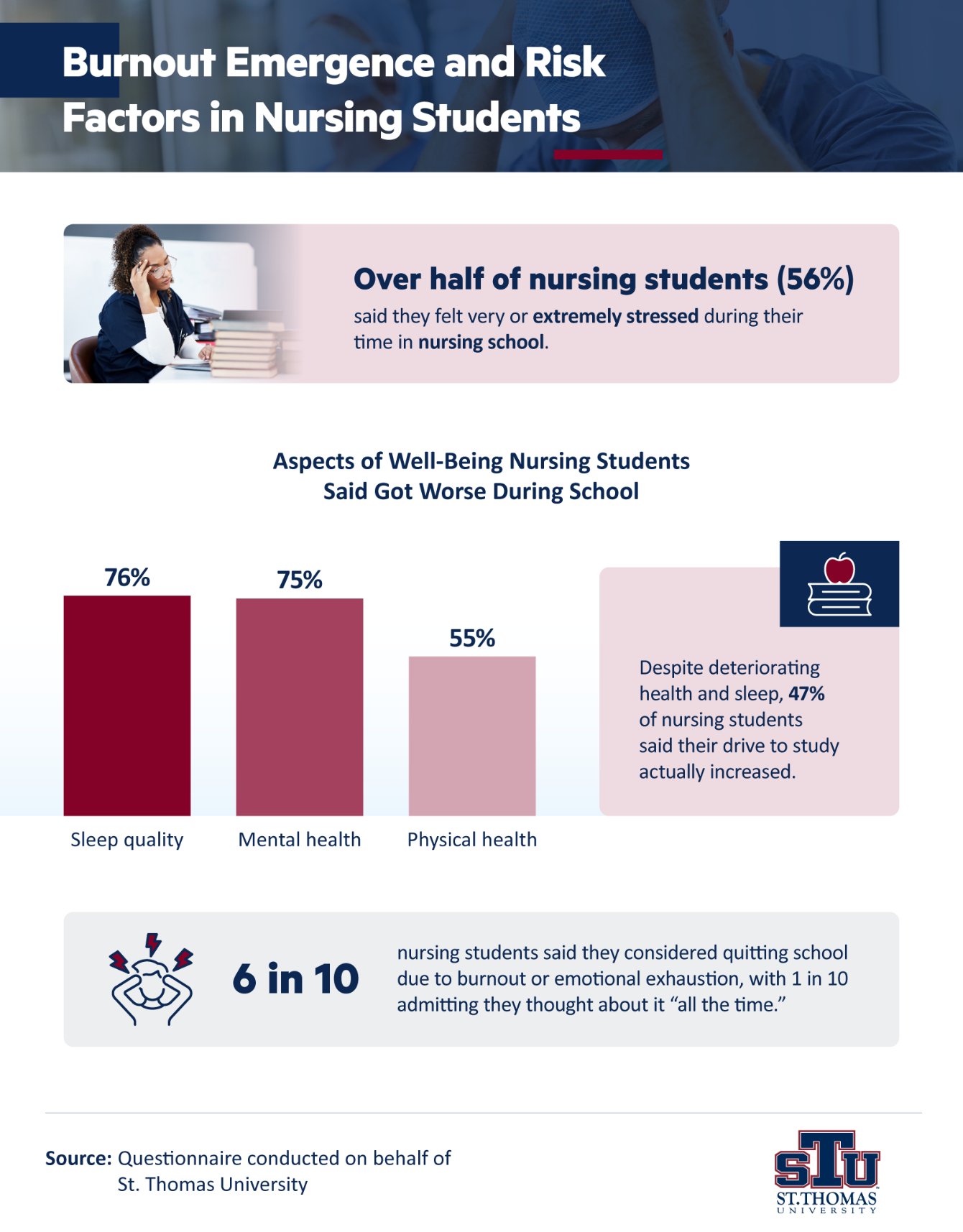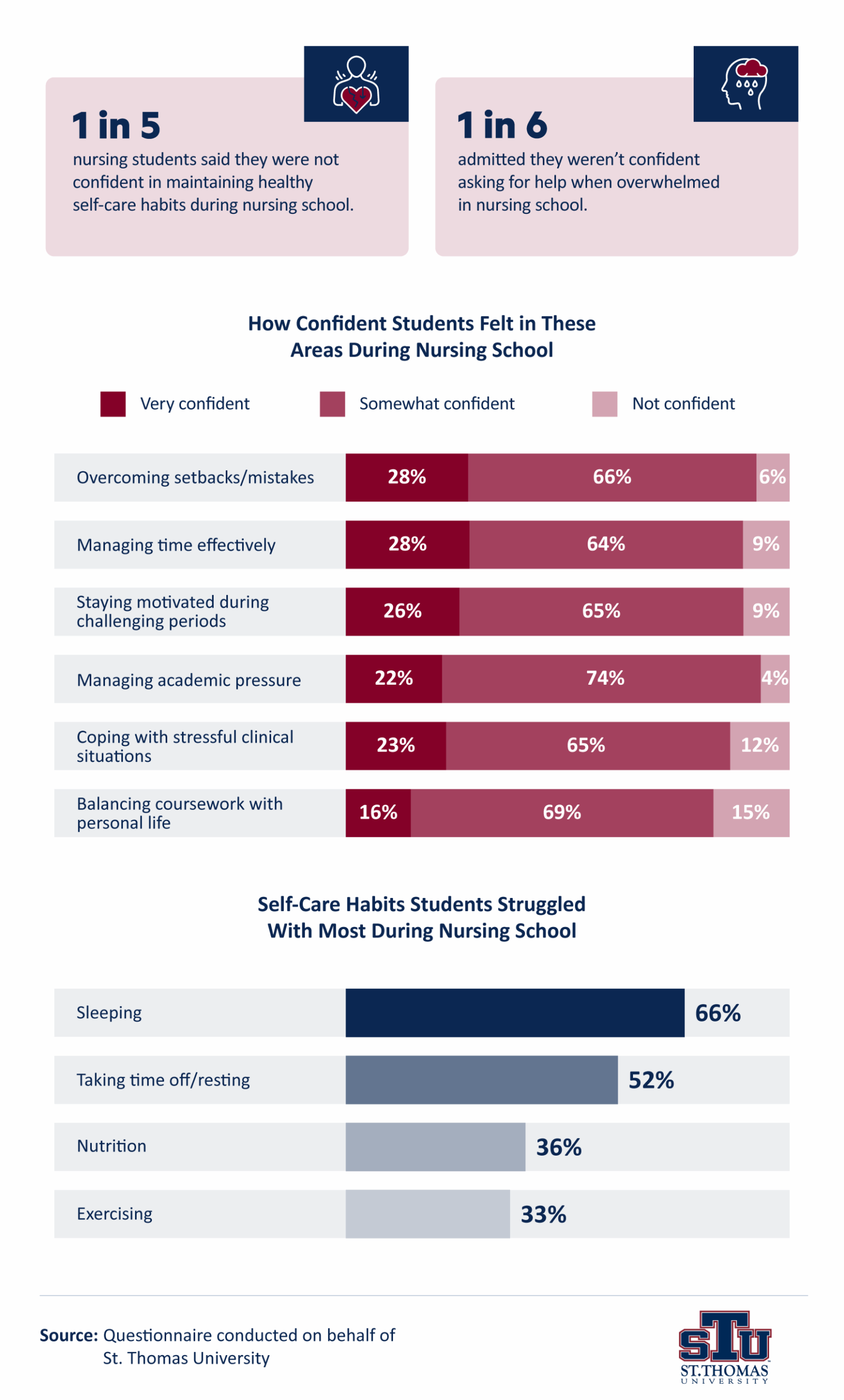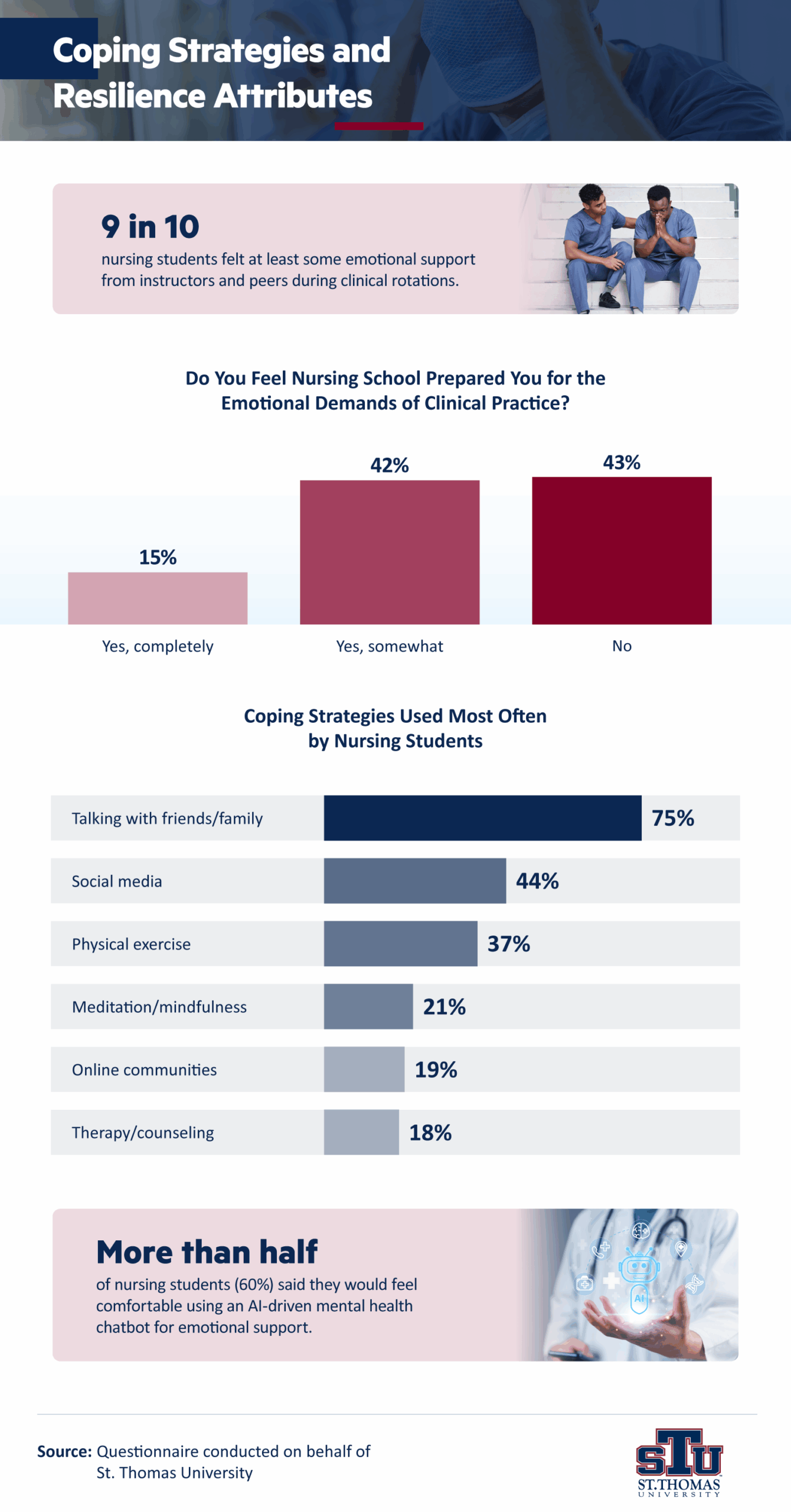
While many students reported struggles with mental health, the data also points to solutions that make a difference. Supportive faculty, strong peer networks and self-care practices can help reduce the risk of burnout while preparing students for the realities of patient care. By focusing on these actionable strategies, nursing schools can create environments that not only address stress but also strengthen the foundation for a successful nursing career.
Key Takeaways
- Three in five nursing students said they considered quitting school due to burnout or emotional exhaustion, with one in 10 admitting they thought about it “all the time.”
- Over half of nursing students (56%) said they felt very or extremely stressed during their time in nursing school.
- One in five nursing students said they were not confident in maintaining healthy self-care habits during nursing school.
- One in six admitted they weren’t confident asking for help when overwhelmed in nursing school.
- More than half of nursing students and recent graduates (60%) said they would feel comfortable using an AI-driven mental health chatbot for emotional support.
Stress and Burnout Emergence
Nursing school can be one of the most demanding stages in a student’s academic journey. High stress levels and competing responsibilities make burnout a serious concern, but identifying these stressors also reveals where faculty and institutions can provide better support.

The questionnaire found that three in five nursing students considered quitting school due to burnout or emotional exhaustion, with one in 10 admitting they thought about it “all the time.” Gen Z students reported the highest risk, with 67% considering quitting.
More than half of all respondents (56%) said they felt very or extremely stressed during their time in nursing school. These findings align with research from the CDC, which documents high rates of stress and mental health struggles among nursing students and highlights nurse-led interventions as a promising approach.
Another recent study found that 54% of nursing students faced severe to extremely severe anxiety, depression or stress. That report also notes that faculty support can make a difference, but that many nurse leaders and instructors admitted they lack training to recognize and address student mental health concerns.

The questionnaire also uncovered that one in five nursing students were not confident in maintaining healthy self-care habits during school, and one in six were not confident asking for help when overwhelmed. This affects student well-being and potentially the quality of care future nurses can provide if they aren’t able to develop self-care habits.
According to an article in the Journal of Nursing Management, failing to practice self-care raises the risk of nurse burnout and compassion fatigue. Getting enough sleep, eating nutritiously and taking breaks were identified as critical areas where nurses often struggle.
Schools that promote coping skills and self-care activities help students learn how to manage long hours and demanding work environments. Addressing these habits early can help prepare students for patient care while reducing the risk of emotional exhaustion.
Confidence and Coping Skills
Nursing students often encounter high stress, but many are finding ways to build resilience. Confidence grows when students practice strategies that strengthen well-being and prepare them for the realities of nursing practice.

More than half of nursing students surveyed (60%) said they would feel comfortable using an AI-driven mental health chatbot for emotional support. This openness reflects a growing interest in new interventions that complement traditional counseling.
Research shows that AI tools can offer immediate, stigma-free and personalized support for students in distress. As AI becomes more integrated into nursing education, chatbots are viewed as promising resources for tailored assistance that fits students’ needs.
Coping strategies remain a cornerstone of emotional health for nursing students. A recent analysis found that emotion-focused methods (including mindfulness, optimism, and talking with family or friends) are commonly used to manage stress. Problem-solving approaches were also effective, helping students reduce anxiety and feel more in control of difficult situations. Experts recommend teaching these positive coping skills early in a degree program.
Relationships within nursing education also play a vital role in student resilience. Instructor support has been shown to improve academic satisfaction and retention, highlighting the importance of fostering clinical environments that encourage confidence and psychological safety. Strong social support networks from peers, family and counselors also provide an essential buffer against stress.
Social media can also shape coping behaviors, both positively and negatively. While it provides opportunities for connection and sharing self-care ideas, it can also contribute to stress when comparisons or misinformation are involved. Nursing educators and nurse leaders can guide students in using online spaces responsibly to maintain emotional health and strengthen resilience throughout their degree program.
Nursing Student Guide: Strategies to Build Confidence, Resilience and Emotional Intelligence
Nursing school brings unique pressures, from long clinical hours to challenging coursework. To thrive, students need more than academic preparation. They must develop confidence and habits that protect their well-being.
This guide offers practical strategies and resources for nursing students and programs to foster resilience, encourage healthy coping skills and create strong support systems. By building these foundations early, future nurses can better manage stress, maintain balance and prepare for the demands of a healthcare career.
Strengthen Emotional Resilience
Emotional resilience is the ability to adapt to challenges, manage stress and recover from setbacks. Nursing students can develop it by:
- Practicing self-compassion when facing academic or clinical setbacks
- Using journaling or reflective writing to process experiences
- Building supportive relationships with peers, mentors and family members
- Staying grounded through mindfulness or relaxation exercises
- Viewing feedback as a way to grow, rather than criticism
Build Social Support and Peer Networks
A strong support system can buffer stress and strengthen resilience. Nurses work best when they feel a sense of belonging in academic and clinical environments. Ways to build social support networks include:
- Spending time with family members and close friends
- Joining study groups to share learning strategies
- Creating communities of care that improve well-being
- Relying on loved ones during periods of high stress
Prioritize Physical Health and Self-Care Practices
Strong self-care habits are essential for success in nursing school. Sleep, balanced nutrition, regular exercise, and intentional rest directly influence mental well-being and academic performance. Self-care recommendations include:
- Maintaining consistent sleep routines for improved focus
- Engaging in physical activity such as walking, yoga or group exercise
- Scheduling breaks and downtime to maintain work-life balance
- Choosing nutritious foods that support energy and concentration
Utilize Professional and Technological Support
Professional counseling and technology can supplement self-care practices. AI-driven chatbots are gaining traction among nursing students as accessible tools for mental well-being, offering stigma-free support when in-person care is not available. Nursing programs can also highlight available clinical services, including those led by a mental health nurse or family nurse practitioner. Support options to consider:
- Accessing counseling services through nursing programs
- Exploring interventions led by registered nurses in acute care settings
- Using AI chatbots to complement professional support
- Seeking mentorship while completing a Bachelor of Science or advanced nursing program.
Please note: AI chatbots can be helpful for quick check-ins, but they are not a substitute for professional mental healthcare. Students experiencing ongoing stress, anxiety or depression should seek support from licensed counselors, mental health nurses or other qualified professionals.
Understanding Today’s Nursing School Experience
The realities of nursing education show that nursing students often face high stress and risk of burnout, but the outlook is not solely negative. With the right support systems, strong coping strategies and a focus on wellness, students can maintain balance and succeed academically while preparing for demanding roles in healthcare.
Strengthening mental health resources, encouraging self-care practices and building resilience are all proven ways to support well-being in nursing school. When schools, faculty and peers prioritize these efforts, nursing students are better equipped to thrive in their studies and enter the profession ready to contribute to patient care and long-term wellness.
Methodology
This report draws on a combination of original survey research and peer-reviewed academic literature to assess the mental health challenges, self-care habits and resilience of nursing students. To ground these findings, a questionnaire conducted on behalf of St. Thomas University surveyed 163 nursing students, of whom 63% were recent graduates within the past five years, and 37% were current nursing students. All participants were instructed to answer survey questions based on their experiences during nursing school, ensuring that results reflect the student perspective consistently across both groups.
Survey results were paired with academic research on nursing student resilience, coping strategies and burnout risk, including:
- CDC (2025): Findings on nurse-led interventions to address stress, anxiety and depression among nursing students, emphasizing faculty support and early coping strategies
- Nursing World Conference Proceedings (2025): Evidence on effective coping strategies (emotion-focused, mindfulness and problem-solving) used by nursing students
- ScienceDirect (2025): Studies highlighting the importance of supportive instructor-student relationships and peer networks in fostering resilience and retention
- PMC Research (2025): Analyses of the growing use of AI-driven mental health chatbots as accessible, stigma-free tools for student emotional support
About St. Thomas University
St. Thomas University prepares healthcare professionals to meet today’s evolving challenges with compassion and leadership. Through its flexible online Master of Science in Nursing (MSN) programs, students can advance their nursing career while balancing work and family commitments. The MSN curriculum emphasizes evidence-based practice, patient care excellence and the skills needed for leadership roles in diverse healthcare environments.
Fair Use Statement
This article draws on data and findings from academic studies, government research and nursing education resources to highlight the challenges and opportunities facing nursing students. The information is provided for educational and informational purposes only. If you would like to share or reference this content, please include proper attribution and a link to this page.